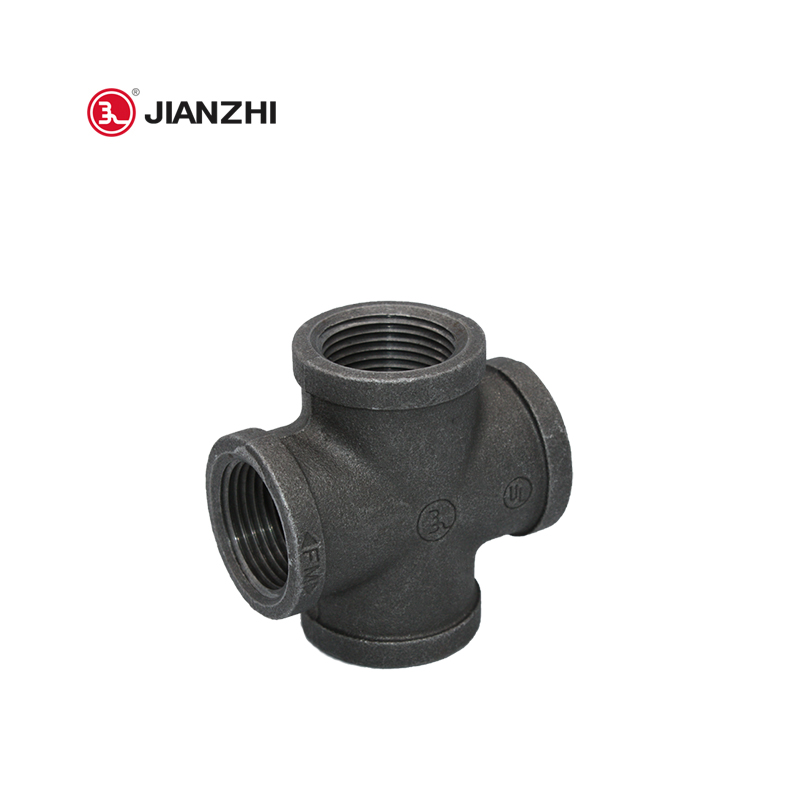In the realm of plumbing, construction, furniture building, and hobby projects, metal pipes and fittings play a pivotal role in ensuring structural integrity and achieving a polished aesthetic. Among the various types of pipe fittings available, black iron and other metal pipe fittings stand out for their strength, durability, and industrial charm. This comprehensive guide delves into the world of black iron and metal pipe fittings, exploring their types, uses, and essential considerations for selecting the right fittings for your project.
Black Iron Pipe Fittings: An Introduction

Black iron cross fitting refers to pipes, connectors, and attachments crafted from black iron or malleable cast iron. These uncoated iron pipes and fittings feature a matte black finish that seamlessly complements industrial-style decor. Black iron, renowned for its strength and rigidity, provides exceptional durability for structural applications and can withstand high water pressure in plumbing systems. Additionally, the cast iron material exhibits remarkable resistance to corrosion and rust, ensuring longevity and reliability.
Common Types of Black Iron Pipe Fittings
The versatility of black iron pipe fittings extends to a wide range of shapes and sizes, catering to diverse project requirements. Some of the most commonly used black iron pipe fittings include:
Elbows: These fittings, available in 90° and 45° angles, facilitate changes in pipe direction, ensuring smooth flow and efficient plumbing or structural configurations.
Tees: T-shaped fittings serve as essential connectors for joining branch and main runs of pipe, allowing for the distribution or merging of fluid or gas streams.
Crosses: These 4-way connectors provide a convenient means of joining pipes from four different directions, creating intricate piping networks.
Caps: End caps effectively seal open pipe ends, preventing leakage and maintaining system integrity.
Couplings: Couplings act as straightforward connectors, seamlessly joining two pipes to extend the length of a pipe run.
Unions: Threaded connectors known as unions enable quick assembly and disassembly of two pipes, simplifying maintenance and repairs.
Bushings: Reducers, or bushings, facilitate transitions between pipes of different sizes, accommodating changes in pipe diameter.
Nipples: Short connector pipes, referred to as nipples, serve as versatile components for connecting pipes in various configurations.
Flanges: These ring-shaped fittings provide a secure means of bolting piping to walls or equipment, ensuring stability and preventing movement.
Benefits of Using Black Iron Fittings
The popularity of black iron fittings stems from their inherent advantages, which make them ideal for a multitude of applications:
Strength and Rigidity: Black iron fittings excel in providing exceptional strength and rigidity, making them particularly suitable for structural support applications.
High Water Pressure Resistance: Their ability to withstand high water pressure makes black iron fittings ideal for supply plumbing systems, ensuring reliable water distribution.
Corrosion Resistance: Cast iron’s inherent resistance to corrosion and rusting guarantees long-lasting performance, even in challenging environments.
Fire-Proof Properties: Black iron fittings possess fire-proof characteristics, as cast iron does not burn or melt, enhancing safety in various applications.
Industrial Aesthetic: The distinctive black color of these fittings complements a wide range of decor styles, adding an industrial touch to both residential and commercial spaces.
Durability: Properly installed black iron fittings can endure for decades, providing a cost-effective and long-term solution.
Code Compliance: Black iron fittings adhere to plumbing and construction standards, ensuring compliance with regulatory requirements.
Other Metal Pipe Fittings
While black iron fittings are widely used, various other metal pipe fittings are available to cater to specific project needs and preferences:
Galvanized Steel: These fittings feature a corrosion-resistant zinc coating over steel, making them suitable for outdoor or moisture-prone environments.
Stainless Steel: Fittings crafted from stainless steel offer exceptional resistance to rust and corrosion, making them ideal for harsh environments and demanding applications.
Copper: Copper fittings are commonly used for water supply lines and gas piping, benefiting from natural rust resistance.
Brass: Brass fittings, known for their corrosion resistance, are often used for decorative purposes due to their attractive appearance, but they tend to be more expensive.
Chrome Plated: Chrome-plated fittings feature a decorative chrome finish over steel or iron, adding a touch of elegance to exposed piping systems.
PVC/CPVC: Lightweight and non-metallic, PVC and CPVC fittings are suitable for low-pressure systems where corrosion resistance is crucial.
